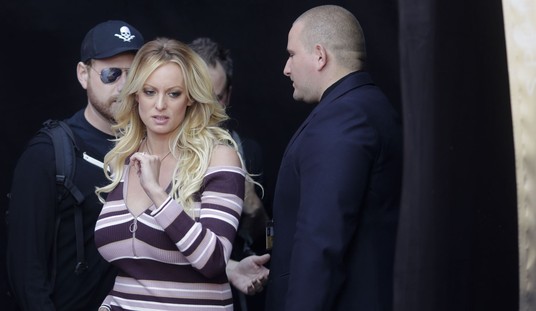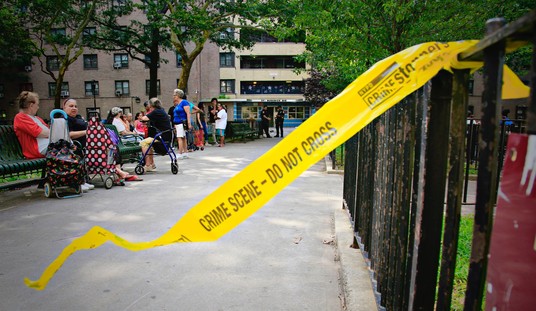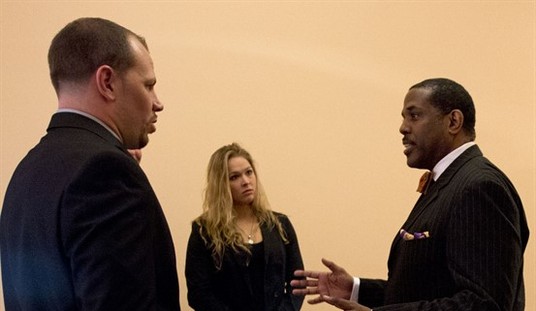Egypt’s revolution against Hosni Mubarak captivated the world. It helped inspire an armed rebellion against Moammar Qaddafi’s hellish dungeon in Libya and peaceful protests against Bashar al-Assad’s Baath Party regime in Syria despite his government’s ruthless repression. The only problem with the Egyptian revolution is that it was not a revolution. It was a coup d’etat against the president by the army.
The coup d’etat had the support of the people, of course. It might not have happened had mass demonstrations not broken out, and it certainly wouldn’t have otherwise happened on the day that it did. Still, no one from Mubarak’s political opposition is in charge. The Supreme Council of the Armed Forces rules the country as a military junta.
Hala Mustafa is distraught by all this. She’s one of Egypt’s most prominent liberal intellectuals and the founder and editor-in-chief of Democracy magazine. The authorities have been hounding her for years by smearing her name in the press, wiretapping her phones, and sending her anonymous death threats. Her name appeared in newspapers all over the world not long ago when the government launched an official investigation into her private life after she met the Israeli ambassador in her office at the Al Ahram Center for Political and Strategic Studies.
My colleague Armin Rosen and I met with her in that same office this summer.
“I hope this doesn’t come across as a paranoid question,” Armin said to her, “but do you think your office is bugged?”
“Of course!” she said. “Yes. It’s very bugged.”
“So I guess if I have a message for Egyptian intelligence,” I said as I chuckled and set down my coffee cup, “this would be the time to deliver it.”
Perhaps I should have been alarmed at the possibility that the mukhabarat might be spying on me as well as on her, but the news wasn’t as disturbing as it would have been if I were interviewing dissident intellectuals in North Korea of Syria. Cairo’s regime is an Arab Nationalist military dictatorship, but it’s built on the a standard issue authoritarian model rather than a totalitarian one to keep order. The odds that anyone in her office would be arrested were small, and the odds that any of us would be kidnapped or assassinated by the state were infinitesimal. Even so, Egypt is not the free country some mistake it to be.
“The moment of liberal change hasn’t come yet,” she said. “The regime today is the same one that was founded in 1952. This is still the Nasserist regime. I was hoping this revolution would bring something different, that we could return to the liberal tradition that existed before Nasser destroyed it. Egypt had a historic opportunity to revive its liberal past, but the moment has passed. The military didn’t encourage that path, the Muslim Brotherhood jumped over everybody to manipulate the process, and the liberal secular forces retreated.”
Egypt really did have a liberal tradition, at least relative to what it has now, before the so-called Free Officers led by Gamal Abdel Nasser launched their military coup against King Farouk in 1952. Egypt was hardly a democracy at the time, but it was much more open and tolerant and oriented toward the West than it is now. Nasser changed everything when he imposed socialism (in the Russian rather than Scandinavian style), pan-Arab Nationalism, and a particularly virulent strain of violent anti-Zionism. Yet with Soviet backing he transformed Egypt into something that looked like a regional superpower.

A painting inside the military museum at the Citadel shows Gamal Abdel Nasser in his modern suit winning the support of Yemen's traditional tribesmen.
Many Sunni Arabs throughout the region swooned to his pan-Arabism and wished to be annexed by Cairo. Syria actually did annex itself to Egypt for a couple of years when the two merged into the doomed United Arab Republic. Nasser even started military adventures abroad when he sent soldiers to Yemen and sparked the Six Day War against Israel. Both conflicts led to disaster, especially when the loss against Israel in 1967 ended with the Israeli occupation of the Sinai Peninsula.
The regime is an Arab Nationalist one, but radical Islam has been gaining in strength ever since Nasser squelched Egypt’s liberalism. The overwhelming majority of women throughout the country wear headscarves now whereas few did in the first half of the last century. A startlingly large number of men sport bruises on their foreheads—acquired by hitting their heads on the floor during prayer—to show off their piety. I see more men with bruised foreheads in a single day in Cairo than in all other Muslim-majority countries I’ve visited in my life put together.
The revolution, coup d’etat, or whatever we ought to call it, has not returned Egypt to 1951, the year before Nasser. History has no rewind button. Egypt can’t regain what it lost when King Farouk was overthrown any more than the United States can suddenly go back to the Truman era.
“All we can do,” Mustafa said, “is preserve the minimal amount of our liberal tradition that still remains. But the military rule and the growing Islamization of the society make it very difficult. The conservative forces are trying to prevent any sort of progress in the country. The military rulers are different from the Muslim Brotherhood, but they don’t contradict each other.”
Most Western analysts describe Mubarak’s government as an American ally that was at least moderately cooperative with Israel, which is accurate to an extent, but his state-controlled media cranked out vicious anti-American and anti-Israeli propaganda every day for three decades. No one should expect liberalism (and I’m using that word in its general sense, not in the parochial American sense) to emerge any time soon after all that. Egypt’s official propaganda after it signed the peace treaty and after it replaced the Soviet Union with the United States as its nominal ally has been no better than it was during the heyday of Nasser’s pan-Arabist days.
It’s difficult to imagine how any new Egyptian president with even an ounce of popular legitimacy could make Israel or the United States happy. It’s just as hard to imagine a Westernized president getting elected or having the support of the army, though there are some Westernized Egyptians around. Hala Mustafa is hardly the only one, but she belongs, alas, to an ideological minority.
“I’ve read many American analyses of the Arab Spring,” she said, “but most neglect the presence of the regime. Americans seem to think the regime went down with the dictator, but it’s not true. So they’re basing their analysis on what the people in the street do and say, but they don’t realize the regime is directing the process. The Salafists right now are completely controlled by the state security apparatus and so they’ve suddenly become a major power. They weren’t in the past.”
“What does all this mean for the United States?” I said.
“That the moment of change hasn’t come yet,” she said. “It was a premature revolution. Mubarak’s regime wasn’t Mubarak’s. It was the regime that was founded in 1952 and it’s still here. The regime’s attitude against Israel is the same. Americans thought Mubarak was with Israel, but it’s not true. Mubarak did nothing to change the propaganda or advance peace. You have to rethink what was happening.”
I saw for myself what kind of message the military regime put out when I visited the October War Panorama in Cairo that commemorates Egypt’s supposed “victory” against Israel in the Yom Kippur War of 1973, a war Egypt actually lost.
The panorama museum was built by North Korea and is the largest and most outrageous of its kind I have ever seen.
Outside, across the street from a Soviet-style apartment complex, fighter jets, missiles, and tanks are on display for everybody to gawk at. You can easily see them from the sidewalk without paying admission. You can’t even miss them while driving past in a car. That’s how I first found out the panorama even existed. My taxi driver took me past the gate on my way to the airport in 2005.
“What’s that?” I said as I gestured toward old air force jets propped up on stands and pointing to the skies.
“It’s a museum celebrating our victory against Israel in 1973,” he said as if he actually believed Egypt won rather than lost. Hassan Nasrallah’s empty boast of a “divine victory” against Israel in Hezbollah’s’ 2006 war is part of a preposterous tradition that goes back a long time. I promised myself I’d visit the museum on my next trip to the country.
Inside the main entrance are a series of murals in the ancient style showing Semitic slaves being captured and tormented by the Pharaonic regime alongside modern Israeli soldiers being trampled on and humiliated by 20th century Egyptians.
The set piece and the museum’s namesake is an enormous panoramic painting depicting the Yom Kippur War when Egypt mounted a temporarily successful surprise attack against the Israeli forces in the Sinai before Israel counterattacked and finished the war on its terms.
Visitors sit in theater-style chairs on a raised platform that slowly spins around so they can sit back and leisurely take it in.

An Egyptian man takes in North Korea's panoramic depiction of Egypt's bogus "victory" against Israel in 1973
Bogus history punctuated with bombastic martial music and cries of “Allahu Akbar” (“God is great”) plays over a single-channel audio track. All the women in the audience wore headscarves, and everyone in the audience, men and women alike, stared at me as though I had purple paint on my face. They must have wondered what on earth I was doing there and what I thought of it all.
The elite in the government and the army know they lost the war in 1973. How could they not? They’re lying to puff themselves up. And they’ve never stopped broadcasting the message that Israel and the United States are their enemies. Right now the army is blaming all the problems in the country on foreign (i.e., Israeli and American) saboteurs and subversives, and just a few days ago tightened entry requirements on Western visitors, even tourists. This is not the way a peaceable ally behaves, but aside from the new visa requirements, it’s nothing new, really. Mubarak’s government did the same thing.
It’s next-to impossible to get an interview with anyone on the junta. I was laughed at when I tried. “They won’t give interviews to the Egyptian media let alone the American media,” by Egyptian colleague Yasmin El-Rifae said.
No one from the army gives speeches. No one from the army goes on television to talk about what it is doing or what it wants. The armed forces council has virtually no contact with the society it rules whatsoever. Its soldiers are not ubiquitous on the streets like those of so many Arab armies. Once in a while the junta will send out a press release, and it has even done so via Facebook, but the officers are so utterly distant and removed from their subjects it’s as if they’re holed up in a bunker in the sky over the horizon. It appears as though the army isn’t even doing much now, but Hala Mustafa insists it has a plan.
“First,” she said, “the army want to calm people down, then to proceed with a transition—a new constitution, parliamentary elections, then presidential elections. They want to maintain the regime with some changes.”
One of those changes is supposed to include presidential and parliamentary elections which might be free and might not. She thinks the army can get what it wants without cheating because a coalition led by the Muslim Brotherhood is likely to win and will be backed by the army. We’ll have to wait and see if that actually happens, but it’s what she’s expecting.
“The army will win,” she said, “so there is no need to rig the election. The Muslim Brotherhood is the most powerful party in the country, and it doesn’t contradict the army. If they win, they know how to work together.”
The army and the Islamists have a strange relationship with each other that neither explains or is honest about. The state has viciously repressed the Brotherhood at times while at other times using it as either a sword or a shield against liberals.

Hosni Mubarak (center-right) and Anwar Sadat (far-right) are shown directing the military victory that was actually a defeat in the 1973 war against Israel. This depiction was made during Mubarak's presidency by a North Korean artist.
“It has been like this since 1952,”Mustafa said. “They have an old relationship. The Free Officers who made the 1952 coup had no real ideology aside from attacking the old regime and forcing King Farouk to step down. They had no other agenda. So they depend on the Muslim Brotherhood which has some popularity. When they clash it’s over the issue of sharing power. It’s not an ideological dispute. So sometimes the army puts them in jail, and other times the army coordinates with them as long as it looks like they won’t have to share power. But now they have an understanding with the army. They’re fine.”
I asked her what she thought about the game Mubarak played with the United States, how he claimed the Muslim Brotherhood would only get stronger if he opened up Egypt’s political system as Washington asked.
“I think the army is trying to prove he was right,” she said and laughed. “His men, his establishment want to prove he was right. He’s gone, but they are still here, and that’s why they’re co-opting the Muslim Brotherhood.”
She insists the regime has been far more consistently anti-liberal than anti-Islamist. “And the army recently released Anwar Sadat’s assassin,” she adds. “It’s bullshit.”
All the activists I met were optimistic, but Mustafa is not. “I’m not optimistic yet,” she said. “I was optimistic in the beginning, but not anymore.”
Most believe the army’s main concern is its economic interests, which are vast, and that the army isn’t interested in ruling the country indefinitely as an old school dictatorship. That’s the mainstream analysis in Egypt right now, but Mustafa only agrees with it to a point. She insists the army will remain the most powerful force in the country.
“There’s a difference between controlling the country and ruling directly,” she said. “They don’t want to rule the country directly. They will hand over power after the election, and this will make a good impression on the world. This itself is one of their goals. But it doesn’t mean military control over the country will be finished. The army has been in control for all of the previous fifty years, long before the current ruling council was put into place. Eighty percent of the governors are from a military background. Most of those with key positions in the state have a military background. They will likely diminish the power of the president and give more power to the parliament. The president won’t be another Mubarak. He will be smaller. And the parliament will be bigger. The Muslim Brotherhood will control the parliament, and they know how to work together.”
“You think the Muslim Brotherhood will win more than half the seats?” I said. No analyst I know believes that will happen, but of course nobody knows.
“Not necessarily,” she said. “They might only win 30 percent, but there will also be Salafists and independents who will work with the Brotherhood. There will be a coalition with the Muslim Brotherhood and other parties. They’ll be able to manipulate the parliament without reaching that scary 50 percent.”
If she’s right, I suspect the army is working with the Brotherhood mostly for pragmatic reasons. Their ideologies are different, but they overlap in some ways. Both are anti-Western and anti-Zionist. Neither are interested in secular liberal government where religion is strictly a private affair, where the economy is beyond the control of the state, and where military officers follow orders from elected civilians.
Alliances like this have been made before in the Middle East, the most obvious being the one between Syria’s secular Arab Socialist Baath Party regime and its theocratic comrades in Iran, Gaza, and Lebanon. Moammar Qaddafi and his son Seif threatened to forge an alliance with Islamist radicals shortly before rebels drove them from Tripoli. “Libya,” said the younger Qaddafi, “will look like Saudi Arabia, like Iran. So what?”
Egypt won’t look anything like Iran or Saudi Arabia if Tarek Heggy gets his way. He is another of Egypt’s public intellectuals. He’s made himself slightly famous through his books—his most recent is The Arab Mind Bound—newspaper articles, and television appearances both at home and abroad, though he hasn’t been harassed by the state as much as Hala Mustafa has, at least not that I am aware of. He is a political liberal as she is and, like her, is an outspoken opponent of both military rule and radical Islam.
He also shares Mustafa’s lack of hostility toward Israel. In 2008, along with Professor Naim Mahlab, he established the Tarek Heggy scholarship at the University of Toronto for post graduate studies in Comparative Jewish/Muslim relations.
His analysis differs a bit from Mustafa’s, however. “The Muslim Brothers,” he says, “will win fewer seats than people expect, probably only 15 to 25 percent.” Like her, though, he blames Egypt’s military regime not only for the problems it creates directly itself, but also for the size and power of the Muslim Brotherhood.
I met him in the lobby of a hotel outside the Mediterranean city of Alexandria where he and his wife were escaping the heat, smog, noise, and congestion of Cairo. Unlike Hala Mustafa, he didn’t emphasize the way the regime at times cooperates with the Muslim Brotherhood, but he seems to agree with her that the government should have worked with the more liberal elements in the society to keep the Islamists at bay and on the defensive.
“I personally think there is nothing worse than Mubarak’s era,” he said as we sipped from tall glasses of Egyptian-brewed beer. “All the problems we have now come from Mubarak’s era. Even if we end up in the hands of the Muslim Brothers, it is because of Mubarak. He didn’t handle them properly.”
“How would you have dealt with the Muslim Brotherhood?” I said.
“He handled them only with a stick,” he said, “and you can’t handle Islamism with only a stick in your hand. I would have exposed them to open debate. I would have let all Egyptians know that their ultimate objective is power, the caliph system, and the implementation of Islamic law. I would have made sure that more women, more liberals, and more Christians knew exactly what would happen to them under the Muslim Brotherhood. I would have used the media appropriately. I would have shown people what happened in Iran.”
He meant the 1979 revolution, of course, when the Islamists seized power in the wake of the Shah’s downfall and built a regime even more oppressive than the one that came before it.
“Mubarak’s Egypt was a very strong police state,” he said. “It shouldn’t have fallen easily, but it did, partly because of the popular movement, but also because of the army. You can’t look at one and exclude the other. There was a coup d’etat. That’s why less than a thousand people were killed.”
Heggy knows a bit more about what happened behind the scenes and off camera than most journalists and foreign observers do, partly because he knows some of the actors personally. Former intelligence chief Omar Suleiman, for instance, is his neighbor. Sometimes they talk.
“Here’s the dramatic story,” he said. “On the 10th of February, Mubarak signed a decree sacking [Defense Minister Mohammad Hussein] Tantawi and appointing the head of the republican guard. The decree was sent to TV stations to be read on the air. The head of the TV station took it in his hand and went to Tantawi. So Tantawi was warned 24 hours before Mubarak stepped down. A half hour later the first announcement was made, and it was vague: The Supreme Council of the Armed Forces will continue meeting until the problem is sorted out, and the army will always side with the people. That was the first announcement, which, for somebody like me, was a sign of the coup d’etat.
“The following day,” he continued, “Omar Suleiman was asked to read a statement that Mubarak was supposed to have written, but instead he read something that was crafted by the army. Mubarak heard it for the first time on TV just like the rest of us did, and he was removed to Sharm El-Sheikh. The head of the republican guard has been in jail since that minute. The main function of the republican guard is to prevent a coup d’etat.”
“That’s what it’s for,” I said.
“It’s not for anything else,” he said. “It’s there to protect the president from his own army.”
Yet Mubarak’s republican guard failed to protect him. That’s how transitions of power often take place in the Middle East and North Africa. Mubarak was an army man as were Nasser and Sadat, but his son Gamal, whom he had groomed to succeed him, was not. Maybe that’s why the army removed him and maybe it isn’t. I don’t know. I’m not sure anyone does. All that matters is that the army did remove him and has the power to remove anyone else it doesn’t like, for whatever reason, in the future.
That could either be a good thing or a bad thing, depending on your point of view. Americans who are more interested in peace and stability than popular self-government in the Middle East may be heartened to think the army may act as a check on the Muslim Brotherhood or any other potentially dangerous political movement, but the army has better relations right now with the Muslim Brotherhood than with anyone else in the country. On the flip side, though, the army is entirely uninterested in fighting another hot war with Israel.
“Egyptian-Israeli relations will be decided by the army,” Heggy said, “and the army is totally against confrontation with Israel. In the streets people say they want to renegotiate the Camp David Agreement, but the army will never go for anything like this.”
“Is that because the army knows it lost the 1973 war even though the government pretends Egypt won?” I said. Just days before I had seen the otherworldly propaganda at the panorama, propaganda that is apparently taken seriously by ordinary Egyptians.

A statue portrays Egyptians soldiers paddling an inflatable raft during the Yom Kippur War against Israel in 1973
“I like the way your phrased that,” Heggy said. “Everyone here thinks we won in 1973 and only lost in 1967. We did very well during the first week in 1973, but wars are judged by how they end, not how they begin. Sadat didn’t want to fight in 1973 to win. He wanted to fight for some pride when he sat at the negotiating table. That’s what his wife, who is a very good friend of mine, said to me at her house in Maryland. Sadat told her many times that the best he could do in a war against Israel is put in a good performance at the beginning. They have a better army, better training, and they have America behind them. He said he needs to be able to sit down and talk to Israelis with his head held high, and he could only do this by first giving them a good punch. They will give him two good punches, but at least he will have given them one.”
Sadat didn’t only need to “punch” Israel so he could hold his own head up high. The entire country felt, and still feels, humiliated by its repeated losses in wars against Israel. It isn’t easy for even a military dictator to keep his finger off the trigger when the entire country is crying for war. Egypt’s army is certainly more rational in its behavior toward Israel than it would be if it heeded public opinion, but the army is partly responsible for shaping current public opinion. The brass hardly likes Israel or the United States any more than the Muslim Brotherhood does.
Few Egyptians I’ve spoken to other than Heggy seem to have paid even the slightest attention to what happened in Iran after the 1979 revolution when Ayatollah Ruhollah Khomeini’s Islamists took over. There are at least two excellent reasons for that. First, Egypt’s Free Officer’s regime, unlike the Shah’s, hasn’t fallen. And second, the Muslim Brotherhood stands virtually no chance of creating its own army inside the country as Khomeini did when he built the Revolutionary Guard Corps in Iran and Hezbollah in Lebanon. There’s only room for one army in Egypt, and any attempt to create two would be suicidal.
Egypt’s revolution is very different indeed from Iran’s, but history doesn’t need to repeat itself exactly before its lessons ought to be heeded.
“Do people here taken Iran seriously?” I said.
“I don’t think so,” he said. “It’s not on the screen.”
“Why?” I said.
“It’s far away,” he said. “Egyptians are among the most localized people in the world. They look inward and greatly exaggerate their value in the world. I’m sure you must know that.”
I saw that in the military museum at the Citadel. This one isn’t like the hysterical North Korean-built panorama. This one is serious, and anyone who sets foot inside will learn how the Egyptian army—and therefore its government—sees itself.
The Citadel’s museum is the kind of thing a (Russian style) superpower would built for itself. Not even in an alternate dimension would anything like this be built by the bumbling Iraqi or Lebanese armies. I can’t quite imagine anything like it being built by any Arab army other than Egypt’s.
The Citadel is a medieval fortification overlooking Islamic Cairo and was built in the 12th century by Salahaddin (aka Saladin), the Kurdish warrior who reconquered Jerusalem from the Crusaders and made himself Sultan of Egypt and Syria. It’s fitting that the Egyptian army built its museum in this place. Its officers clearly think of themselves as modern-day descendents of Egypt’s ancient and medieval warriors.
Unlike the panorama, the building housing Egypt’s military museum isn’t a North Korean cartoon. This place looks like it was built by Victorian-era imperialists from Great Britain.
Egypt’s military adventures abroad are celebrated here, against Israel, Yemen, and Saddam Hussein in the first Persian Gulf War.
North Korea’s hand is apparent, though, even here. The Kim family donated the services of one of its painters to illustrate an Egyptian-Israeli air war over the Sinai in 1973. The painting was commissioned during Mubarak’s tenure in 1993, many years after Sadat signed the peace treaty with Israel.
Egypt’s geopolitical clout fell after it signed that treaty. It is no longer anything like a mini regional superpower. There is no reason to believe, however, that the elite in the armed forces wouldn’t like Egypt to rise once again if it can unshackle itself from American requests that it be a status quo power. They clearly see themselves as bigger and more important that that, and serious moves in that direction should play very well on the street.
Egypt isn’t Iraq, and it is not Lebanon. Its politics are not militarized. Nearly every gun in the country is held by the army, and if the army has an ideology it’s one of crony capitalism and nationalism, not radical Islam. It was only a few months ago that liberals in Tahrir Square said “the army and the people are one hand” after the military forced Mubarak out, but today they correctly describe the junta as the military dictatorship that it is. It hasn’t fallen out of favor as much as Mubarak did, but it has fallen.
The Muslim Brotherhood has lost some of its popularity, too, for a number of reasons. It denounced and intimidated Egypt’s liberal and leftist activists, it is colluding with the military dictatorship, and Egypt’s political space in the post-Mubarak era has opened up space for more parties. Last year the Muslim Brotherhood was the only real opposition in town. It could count on the anti-Mubarak “protest vote.” That is no longer true. Both the Islamists and the army have less legitimacy than they recently did.
But what if they save each other by banding together? That’s what Hala Mustafa is afraid of. She’s frustrated that Western analysts don’t seem to get this, but Paul Berman said as much himself not long ago in The New Republic.
“The Egyptian army,” he wrote, “which must be dreaming of action, is also maneuvering to survive, and if the generals have not already cut a deal, surely they are working on one, which can only mean that, in the Arab world’s leading country, the army and the Brotherhood are arranging a do-over of their unfortunate falling-out in 1952, and this time the results will make room for both of them.”
No doubt Washington and Jerusalem prefer to do business with the military instead of the Brotherhood even if the regime was founded in a spirit of Arab Nationalism and Egyptian supremacy. But what if the U.S. and Israel will soon have to contend with both?
–
It cost me thousands of dollars out of my own pocket to visit Egypt. And it will cost me thousands of dollars out of my own pocket to visit wherever I’m going next. If you haven’t supported me recently (or ever), please help me out so I can keep doing this. PayPal donations add up to plane tickets, and so do sales of my new book In the Wake of the Surge.
You can make a one-time donation through Pay Pal:
[paypal_tipjar /]
Alternatively, you can make recurring monthly donations. Please consider choosing this option and help me stabilize my expense account.
[paypal_monthly /]
If you would like to donate yet don’t want to send money over the Internet, please consider sending a check or money order to:
Michael Totten
P.O. Box 312
Portland, OR 97207-0312
If you don’t want to donate, buy my new book!

You can get the Kindle version for only 9.99, and it will put just as much money in my pocket as if you buy a print copy
.
Thanks in advance to you all.




























Join the conversation as a VIP Member